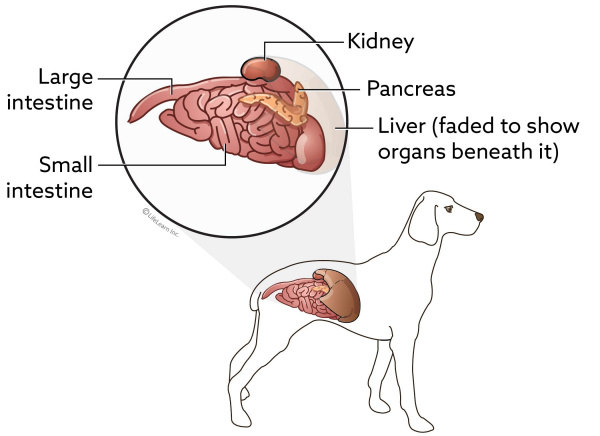When pancreatitis occurs the symptoms depend on the severity of inflammation but in most cases the following symptoms will be present. What causes pancreatic tumors.
 Exocrine Pancreatic Cancer The National Canine Cancer Foundation
Exocrine Pancreatic Cancer The National Canine Cancer Foundation
Symptoms of Pancreatic Cancer.

How to diagnose pancreatic cancer in dogs. Due to the aggressiveness of this cancer it is often metastatic and malignant. Recovery of Pancreatic Cancer Insulinoma in Dogs Prognosis is poor if insulinoma is detected late or symptoms are ignored. Sadly this is beacuse many times pancreatic cancer is found late once the tumor is in advanced stages and has metastasized spread to other areas of the body.
Can a dog survive pancreatic cancer. Both of these tumors are more common in dogs than cats. If insulinoma is caught early survival rates are fair.
Very few tumors and cancers have a single known cause. With adenocarcinomas the signs can be vague until late in the disease process. By then its too advanced to respond to treatment so the only thing a vet can do is try to manage the dogs pain says the National Canine Cancer.
Your veterinarian will perform a complete blood profile including a chemical blood profile a complete blood count and a urinalysis. A dog with pancreatic cancer may show signs such as. The following are some of the tests conducted to locate pancreatitis cancer.
By the time the cancer is diagnosed through surgical biopsy it has typically spread to the dogs abdominal lining liver and lymph nodes. But the most effective way to diagnose pancreatic cancer in dogs is using ultrasound-guided fine needle aspiration. Some pets will show signs of pancreatitis inflammation of the pancreas.
This procedure is also less invasive than biopsy. Since the symptoms are closely related to other ailments too it is strictly recommended to take your dog to the wet. Canine pancreatic cancer often doesnt cause symptoms until the disease reaches its later stages.
In addition simultaneous leakage of digestive enzymes from the pancreas breaks down and destroys surrounding tissues increasing the dogs pain. However if they occur the treatments for these are very limited. Most seem to be caused by a complex mix.
Dogs diagnosed with pancreatic cancer generally live anywhere from 6 months to 2 years depending on the severity of the cancer and the treatment plan used. Assumes an abnormal posture -arching of the back- to signify abdominal pain Touching the dogs belly can trigger pain. This procedure is also less invasive than biopsy.
Diagnosis of pancreatitis cancer. A determination of the lipase an enzyme released by the pancreas level will assist your veterinarian in the diagnosis as it is often elevated in a majority of patients with pancreatic adenocarcinoma. He will conduct further tests and investigations and reach the root cause.
If your dog is diagnosed as having a pancreatic tumor it means that the cells within a specific part of your pups pancreas are overproducing reproducing excessively. As with most tumors in animals and people your dogs pancreatic tumor could be either benign non-cancerous or. Few clinical signs include bloody vomiting weight loss yellowish gums etc.
The dog is lethargic and will prefer to lie down. Altogether the most common pancreatic cancer in dogs and cats are insulinomas followed by adenocarcinomas. Many symptoms of pancreatic cancer in dogs are non-specific.
Insulin and blood sugar tests can lead to a preliminary diagnosis of insulinoma. The reason why a particular pet may develop this or any tumor or cancer is not straightforward. The underlying cause of pancreatic cancer in dogs is not clear.
Once your dog is seen by canine cancer professionals a conclusion will be reached and youll know what steps to take next in an effort to help your dog feel more like their old self. Your veterinarian will also perform abdominal radiographs in order to determine the presence of any masses or changes in the pancreas. SYMPTOMS OF PANCREATIC CANCER IN DOGS.
These cancers are very rare in dogs. The diagnosis of pancreatic cancer in dogs will be achieved through a physical examination and examination of current symptoms and previous medical history. The only official way to receive a cancer diagnosis for your dog is by taking your canine companion to the veterinarian.
Diagnosis of Pancreatic Cancer in Dogs Your vet will likely try to see if he or she can feel a protruding mass in the abdomen which can be a symptom of adenocarcinomas in the pancreas. This includes loss of appetite vomiting lethargy pain in the abdomen weight loss and sometimes yellowing of the skin jaundice.
Main Causes for Pancreatic Cancer in Dogs The causes for canine pancreatic cancer are not well understood. They also appear to be more common in Siamese cats and male cats.
5 Things You Need To Know About Pancreatic Cancer In Dogs Homeoanimal Com
Causes of pancreatitis cancer.

What causes dogs to get pancreatic cancer. Adenocarcinomas are characterized as glandular in structure andor originating in the glandular tissue. If you find yourself faced with a. For example squamous cell carcinoma is a type of skin cancer that commonly affects dogs and too much exposure to UV light from the sun increases the risk of being diagnosed with this cancer.
Both types of cancer typically originate in the pancreas and are typically malignant. There are a number of causes and risk factors that can bring on pancreatitis. Its purpose is to help dogs digest food and regulate their blood sugar.
Another environmental factor that tends to be linked with higher chances of cancer is. You may notice that your pets overall appetite has diminished as a result of his tumorous growth. Similar to other types of cancer adenocarcinoma of the pancreas usually affects older dogs eight years or older.
Insulinomas are more commonly seen in large breed dogs such as Irish Setters Boxers Golden Retrievers and German Shepherds and also in Fox Terriers. The two main forms of malignancy affecting this hormone and enzyme-generating gland have entirely different signs and symptoms treatments and possible outcomes although both tend to affect middle-aged dogs. Pancreatic cancer in dogs is either Primary or Secondary.
Most seem to be caused by a complex mix of risk factors some environmental and some genetic or hereditary. Classically the typical history of a canine patient that is diagnosed with pancreatitis is one in which the dog ate a high-fat meal or got into the garbage. Pancreatitis in dogs occurs when the pancreas a small organ that sits behind the small intestine and the stomach is inflamed and swollen.
A neoplasm or tumor can be either benign or malignant in nature. Unfortunately this is not the most common cause of pancreatitis. It is not easy to locate the exact cause of pancreatitis.
One affects the pancreas exocrine cells that produce enzymes and one affects the endocrine cells which produce insulin. But often what causes these changes is not known. Knowing that pancreatic cancer is less common than many other forms of canine cancer is cold comfort if your dog has been diagnosed with the disease.
These are tumors in the pancreas which are produced due to excess insulin. Theres been a dramatic rise in many types of canine cancer in recent years especially in the organs of the digestive tract and certain foods and diets are considered to be a major contributor. However the most common reason is scavenging and sometimes it might be due to excessive use of foods high in fats.
These acquired gene mutations sometimes result from exposure to cancer-causing chemicals like those found in tobacco smoke. Most gene mutations related to cancers of the pancreas occur after a person is born rather than having been inherited. As this happens your pet will lose out on nourishment that he would otherwise be eating and his weight will gradually and consistently go down.
Though often the attack appears seemingly out of the blue. Few noticeable symptoms can be a weakness tremors collapse and. It can occur in any breed or gender of dog but older female dogs and Airedale terriers Spaniels and Boxers tend to be more susceptible to this disease.
Pancreatic Adenocarcinoma in Dogs. Dogs with pancreatic cancer oftentimes have a difficult time eating sufficient amounts of food. The underlying cause of pancreatic cancer in dogs is not clear.
A carcinoma is a type of malignant tumor found in both humans and animals and tends to be particularly malignant with recurring growth after surgical excision. Primary tumors are when the neoplasm tumor develop in the pancreas and secondary tumors are when the cancer has developed in another organ and then spread metastasized to the Pancreas. This type of tumor is.
There are two main types of pancreatic tumors in dogsinsulinomas and adenocarcinomas. Causes of pancreatitis in dogs. In reality 90 of the time the inciting cause of pancreatitis in dogs is idiopathic cannot be determined.
Popular Posts
-
Wirehaired doxies and Dachshunds in general are considered moderate to low shedders. The area you live in. Wirehaired Dachshunds Rauhhaar...
-
The creatures can live in a variety of geographies and also in a number of different types of habitats. The best known species is the Europ...
-
Baseball Pitcher’s Mound Dimensions . The Baseball Pitcher’s Mound, also referred to as the hill, is the raised pitching area that is ...
Featured Post
high school baseball mound dimensions
Baseball Pitcher’s Mound Dimensions . The Baseball Pitcher’s Mound, also referred to as the hill, is the raised pitching area that is ...

ads
